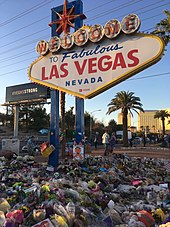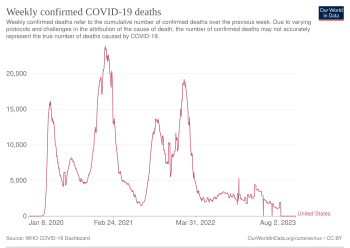History of the United States (2016–present)
Trump ran on a populist message, enacting tax cuts, immigration restrictions, attempting to "Build a Wall" on the US–Mexico border, and an "America First" foreign policy.
In December 2019, the Democratic-controlled House of Representatives voted to pass articles of impeachment against Trump for his alleged role in a scandal involving Ukraine, for which he was subsequently acquitted.
[5] On February 29, 2020, the United States and the Taliban signed a conditional peace deal in Doha, Qatar,[6] that called for a prisoner exchange within ten days and was supposed to lead to US troops withdrawal from Afghanistan by May 1, 2021.
Although Trump's announcement received little attention at first (he had mounted a short-lived third-party presidential run in 2000), he quickly bounded out of the gate with a populist message about his perceived decline of American economic and geopolitical prestige under the previous two administrations.
By the start of the primary season in early 2016, Trump was polling ahead of the other GOP candidates despite his lack of political experience and attracting a considerable following among the party base.
Some right wing conservatives and Christian groups continued to support Cruz, especially as there was controversy over Trump's personal life and relatively liberal attitude on social issues.
As the primaries gave way to the general election, Hillary Clinton faced numerous controversies over her tenure as Secretary of State, namely an email server scandal.
Clinton chose as her running mate Virginia Senator Tim Kaine, seen as a way of connecting with blue collar white voters, Trump's base of support.
[14] Hillary Clinton, however, continued to be embroiled in controversies of her own, the biggest being the revelation that she had used an unsecured private email server during her tenure as Secretary of State, leaving the possibility of having mismanaged or compromised classified documents.
On his first day in office, he undertook a series of executive orders aimed at dismantling the Affordable Care Act and Trans-Pacific Partnership, and also moved to pass a temporary ban on refugees from several Middle Eastern states.
The nomination process soon became contentious after several women, most notably Palo Alto University psychology professor Christine Blasey Ford, accused Kavanaugh of past instances of sexual assault.
The agreement prevented any country from leaving less than three years after it began, so the United States had to wait until November 4, 2019, to officially start the withdrawal process.
The incident sharply escalated a period of already strong tensions with Iran and lead to missile strikes on US military forces in Iraq on January 8, 2020.
In September 2020, the death of Associate Justice Ruth Bader Ginsburg prompted President Trump to nominate Amy Coney Barrett to fill the Supreme Court vacancy.
[41][42] Trump nevertheless urged his supporters on January 6, 2021, to march to the Capitol while the joint session of Congress was assembled there to count electoral votes and formalize Biden's victory, leading to hundreds storming the building and interrupting the electoral vote count; as a result, the House impeached Trump for incitement of insurrection on January 13, 2021, making him the only federal officeholder in American history to be impeached twice (the Senate would later acquit him for the second time on February 13, 2021, after he had already left office).
Biden proposed a significant expansion of the U.S. social safety net through the Build Back Better Act, but those efforts, along with voting rights legislation, failed in Congress.
[74] Later that month Biden proposed a ceasefire under the conditions of: an Israeli withdrawal from "densely populated areas in Gaza, swapping prisoners along with hostages and allowing for humanitarian assistance.
[101] Another poll conducted in 2023 reported that 66% were Christian, 27% unaffiliated (5% stating they were atheist and the same percentage saying they were agnostic while the rest said nothing in general), 2% Jewish, %1 Muslim, %1 Hindu, %1 Buddhist, 0.5% were Unitarian Universalists and 2% came from other non-Christian faiths.
This shooting led to increased dialogue and debate over gun control, particularly the use of bump stocks which allowed the shooter to fire his semi-automatic rifle at a rate similar to a fully automatic weapon.
The Pittsburgh Synagogue shooting of 2018 also led to major debates on weapon control and brought attention to gaps in reporting to the federal background-check system intended to ban convicted domestic abusers.
On March 21, 2019, Cesar Sayoc, 57, pleaded guilty to 65 felony charges related to the bombing, including using weapons of mass destruction and domestic terrorism.
[136][137][138] In March 2021, FBI director Christopher Wray confirmed an October 2020 report from the Department of Homeland Security that said white supremacists posed the top domestic terrorism threat.
At least twelve major cities declared a curfew on the evening of Saturday, May 30, and as of June 2, governors in 24 states and Washington, D.C. had called in the National Guard, with over 17,000 troops activated.
[146] The End Domestic Terrorism rally (sometimes referred to by the slogan "Better Dead Than Red")[160] was a Proud Boys demonstration held in Portland, Oregon, on August 17, 2019.
On October 10, Hurricane Michael struck the Florida Panhandle as a Category 5 storm with 160 mph winds after undergoing rapid intensification just prior to landfall; it killed 45 people in the US and caused $15 billion in damage.
[168][169] A series of destructive wildfires began in the Greater Los Angeles area in early January 2025, including the Palisades, Eaton, and Hughes fires.
Exacerbated by drought conditions and the high-speed Santa Ana winds, they collectively burned over 50,000 acres of land and damaged more than 17,000 structures, resulting in at least 28 deaths and the evacuations of 200,000 people.
[178] In March, many state and local governments imposed "stay at home" orders to slow the spread of the virus, with the goal of reducing patient overload in hospitals.
[180] On April 2, at President Trump's direction, the Centers for Medicare & Medicaid Services (CMS) and CDC ordered additional preventive guidelines to the long-term care facility industry.
[208] In his 2022 State of the Union Address, President Biden announced a new national strategy against the pandemic, including an increased emphasis on antiviral pills and combating new variants.















